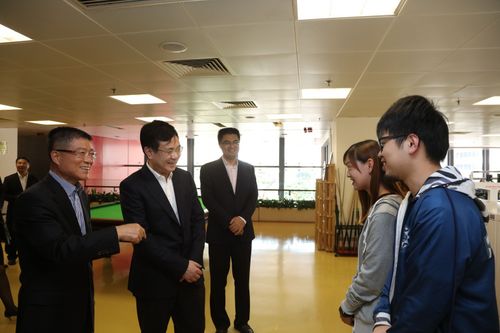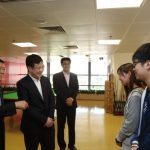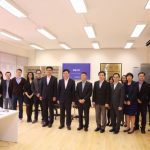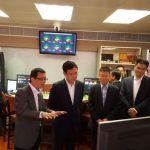 Conversation between Mr. Xue XiaoFeng and MPI
Conversation between Mr. Xue XiaoFeng and MPI
On 28 April Mr Xue XiaoFeng, the Deputy-Director of Liaison Office of the Central People's Government in the Macao SAR and its delegation visited Macao Polytechnic Institute. Mr. Xue XiaoFeng definitely affirmed the programmes' characteristics of MPI and its science and technology research results. Mr. Xue XiaoFeng also had a short conversation with MPI students and teachers to understand their learning and teaching situation. Xue XiaoFeng encouraged MPI to continue to play an important role for both mainland China and Macao and cultivate more high-end professional talents.
Professor Lei Heong Iok, President of Macao Polytechnic Institute welcomed Xue XiaoFeng to MPI and thanked him for his long term support to MPI. Professor Lei Heong Iok remarked that MPI's aim is to "take root in Macao, facing the motherland, facing the world, striving for excellence", in order to teach MPI students "to love our Country and love our Macao". Over the years more than 17,000 students have graduated from MPI's Bachelor degree programmes and more than 100,000 people have attended the short term training courses. Professor Lei also introduced the development of teaching, research and social services of MPI.
The Deputy-Director of Liaison Office of the Central People's Government in the Macao SAR Mr. Xue XiaoFeng definitely affirms the programmes' characteristics of MPI and its science and technology research achievements, which cultivate a large numbers of talents and contribute a lot towards the development of the Macao SAR. Xue XiaoFeng eulogizes MPI for being the first higher education institution in Macao to obtain the International Recognition of the UK Higher Education Quality Assurance Agency (QAA). Xue XiaoFeng proposes four development expectations: 1- Continue to adhere to the principle "One Country Two Systems", Love China Love Macao"; 2- Reinforce the theory and the practice research of "One Country, Two Systems" and continue to play the role of think tank in this regard; 3- Develop the characteristics of the academic operation of MPI, take the initiative to serve the government and the society. Macao as "A Center, a Platform" plays an important role in strategic development between China and Portuguese Speaking Countries. With the good achievement of Chinese-Portuguese Translation and Interpretation, Chinese-English Translation and Interpretation, Gaming and Recreation Management and Science in Computing programmes, Macao Polytechnic Institute is accurately positioned and with the Portuguese translation and interpretation and the Chinese-Portuguese-English machine translation and other aspects, MPI works for the strategic development of the country and for Macao in order to train high-end professional talents; 4- Strengthen the cooperation and communication with the universities of mainland China, and complement each other.
During the visit Xue XiaoFeng and the delegation visited the Chinese-Portuguese-English Machine Translation Laboratory, Translation and Interpretation Laboratory, MPI-UCLA Joint Research Centre in Ubiquitous Computing, MPI - Queen Mary University of London Information System Research Centre, MPI - Melco Gambling and Entertainment Research Centre, Student Union, Students' Activities Centre and others facilities. Xue XiaoFeng also had a cordial conversation with MPI's research team and students, which let Xue XiaoFeng know more about the research work and learning situation in MPI.
The visiting guests also included Mr. Zhao DongChuan, Deputy Director-General of Department of Culture and Education; Mr. Lin QingZheng, Secretary of the Deputy Director-General of Department of Culture and Education; Mr. Li YongXian, Sub-Director of the Department of Culture and Education, and Ms. Cen JiaYi, Assistant of Department of Culture and Education.
View gallery



